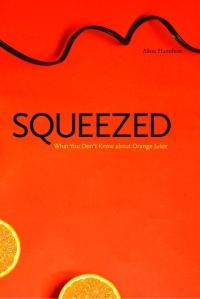Speaking of orange juice, I completely forgot about this little gem of an article that came out of the Boston Globe two months ago and culminated in a significant change in behavior for my family. After reading it you may join me in pondering how exactly Tropicana intends to respond to this disaster that will likely descend on them in about 60 days once this baby hits the morning news circuit.
The article is a Q&A with Alissa Hamilton, a Woodcock Foundation Food & Society Policy Fellow, discussing her forthcoming book, “Squeezed: What You Don’t Know About Orange Juice.”

Let me just cut to the pulpy core of the issue: practically every carton of “not-from concentrate” orange juice you could pick up in the refrigerated section of your local grocery is NOT what you think it is.
As Ms. Hamilton states,
It’s a heavily processed product. It’s heavily engineered as well. In the process of pasteurizing, juice is heated and stripped of oxygen, a process called deaeration, so it doesn’t oxidize. Then it’s put in huge storage tanks where it can be kept for upwards of a year. It gets stripped of flavor-providing chemicals, which are volatile. When it’s ready for packaging, companies such as Tropicana hire flavor companies such as Firmenich to engineer flavor packs to make it taste fresh. People think not-from-concentrate is a fresher product, but it also sits in storage for quite a long time.
Sitting in a metal vat for a year = freshly squeezed? Right, that’s what you’re drinking. Not something that was freshly picked from the grove, squeezed and then rushed to your grocer in a matter of a few days. Even though that is what they would like you to think and for which they expect you to pay a mighty premium.
Until February of this year, my family of 5 were loyal purchasers of the 4 pack of 64 oz Tropicana Premium from Costco and paid something like $4 a carton for what we thought was a close approximation to fresh squeezed juice. Give or take a couple of weeks. I mean, look at the side of the carton where they romanticize the freshly delivered juice that is rushed up the Eastern seaboard from the grove to big cities in the refrigerated Tropicana Juice Train.
Is there any reason to believe there won’t be a huge outcry when consumers learn what they’re actually drinking is not fresh juice taste but a manufactured simulacrum of it? And that even worse, more and more of that juice is not fresh from Florida but instead shipped from Brazil? At that point, the damage done by Mr. Arnell’s ill considered packaging refresh will be a tempest in a teacup compared to the response to Ms. Hamilton’s book explaining how inauthentic Tropicana’s pretty little cartons of juice really are. Then Mr. Arnell can add yet another definition to what the phrase “squeeze” means in the minds of Americans today.
What change did the Breillatt household make, you ask? We decided to go with the best tasting frozen juice we could find since it’s half the price of “not-from concentrate” and essentially the same except you’re not paying for shipping water and the more expensive manufacturing process. Plus you can determine how “juicy” you want your juice by reducing the amount of water you add. Costco has a 6 pack of their Kirkland brand that is actually really good. And when we want that truly freshly squeezed taste? Occasionally we’ll squeeze our own oranges to get nothing but juice.
What’s the lesson from this story? It’s yet to be certain how much of a hit Tropicana and other juices like Florida’s Natural, Simply Orange, and even Minute Maid will take from this revelation. But if they learned anything from the high fructose corn syrup debate, I’m sure they’ll be lining up their brightest PR stars to attempt to make this story go away.
The better answer though is to be truthful with your consumers. In this era where their trust has been battered in multiple areas of our life, consumers are increasingly showing loyalty to brands that stay true to their promises. There really is something to the maxim “authenticity speaks for itself.”
[Update] Seth Godin nails the authenticity trend with his brief post, “What you say, what you do and who you are.”

This just reinforces my preference for frozen concentrate!
Great post! – I encountered a similar article on the subject in The Economist a couple or three weeks ago, and immediately felt betrayed: I’ve regularly bought ‘not-from-concentrate’ juice over the years under the impression that I was buying something relatively natural and healthy. Well, this week we bought a juicer and a heavy-duty blender. I’m done trusting someone else to process my fruit. Homemade juice and smoothies from now on…